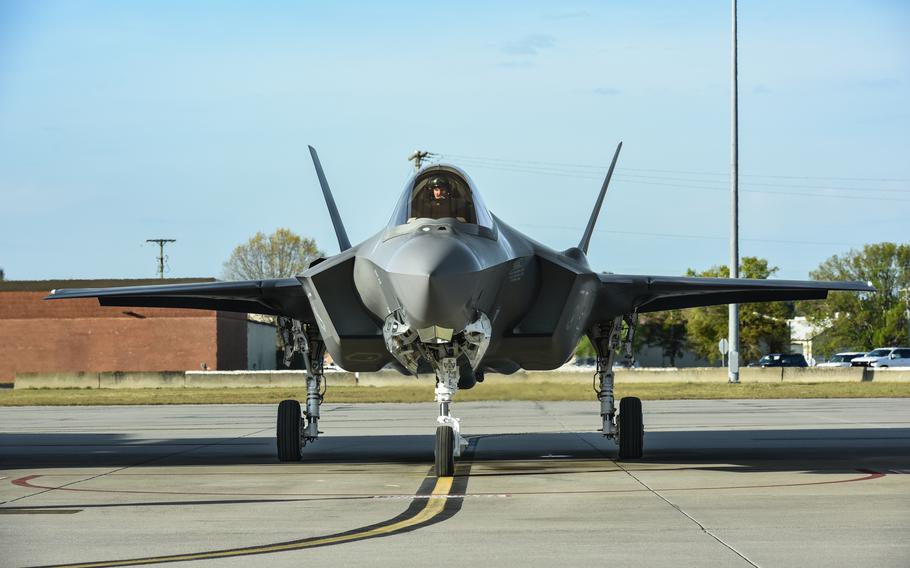
An Air Force F-35 Lightning II fighter jet on March 17, 2023, at McEntire Joint National Guard Base, S.C. (Danielle Dawson/U.S. Air National Guard)
WASHINGTON — Lockheed Martin’s F-35 engines are being overworked and could lead to an extra $38 billion in overhauls in the next few decades to help cool radar and other components of the fighter jets, according to government auditors.
“The cooling system is overtasked, requiring the engine to operate beyond its design parameters,” the Government Accountability Office wrote in its 91-page annual report released Tuesday. “The extra heat is increasing the wear on the engine, reducing its life, and adding $38 billion in maintenance costs.”
Unless there is an effective fix, engine overhauls might come sooner than expected and add another item to the Pentagon’s $1.7 trillion estimate to operate and maintain the fleet until its operational end in the late 2080s.
The concern is with the F-35s power and thermal management system, or PTMS, to cool the parts of the aircraft’s systems that generate heat. The management system transfers pressure from the fighter jet’s single engine to cool other components. However, the more air pressure transferred, the hotter the engine gets.
“The PTMS, however, needs more air pressure from the engine to cool subsystems than originally anticipated, which is reducing the life of the engine,” the GAO wrote.
The power system, based on designs by Lockheed Martin’s subcontractor that produces its engines, Pratt and Whitney, can’t keep up with the cooling demands of the jet's increasingly complex avionics as well as new capabilities already installed or planned through 2035 during an upgrade program called Block 4, according to the GAO.
The GAO’s report disclosed that the cost of the Block 4 upgrade has grown by an additional $1 billion to $16.5 billion, and half of Lockheed’s 2022 aircraft deliveries were late.
However, the demand for F-35s has grown internationally. Global interest in the fighter jet has increased since Russia invaded Ukraine in February 2022 and tensions with China have increased.
This latest GAO report comes one week after the auditors published a report that found the Pentagon is not keeping track of tens of thousands of spare parts for F-35 fighter jets worth millions of dollars because it did not know who is responsible for doing it.
The U.S. military and many nations such as Israel and Japan have been flying the F-35 Lightning II for several years, which creates a need for various parts to be kept at locations in many countries around the globe. The Pentagon maintains a global pool of spare parts that ally countries can tap into when needed. However, there is no Defense Department system to monitor those inventories and keep track of the parts, according to the GAO report.
The F-35 is the most expensive weapon in U.S. military history, and variants of the fighter are being flown by the Air Force, Navy and Marine Corps.
Lockheed Martin has so far produced and delivered more than 900 of the fifth-generation fighter jets to the U.S. military and allied governments, including Italy, Australia, Denmark, the Netherlands, Norway, South Korea and Britain.